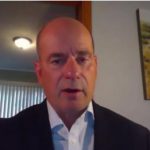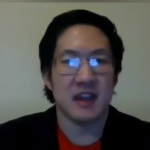【Online Interview Series】No. 3: Leoneda Inge, Reporter, North Carolina Public Radio (U.S)
post date : 2020.07.02
”How Has the World Been Dealing with the COVID-19 Pandemic?”
~No. 3: Leoneda Inge, Reporter, North Carolina Public Radio (U.S) ~
The third interview in this series is with Ms. Leoneda Inge, a reporter for North Carolina Public Radio (U.S.). In 2009, she came to Japan at the recommendation of the Knight-Bagehot Fellowship program’s secretariat, and covered products imported from North Carolina to Japan. Before the interview, she mentioned how she was very surprised when she was greeted by a woman in a mask at the airport when she first arrived in Japan.
Ms. Inge, a radio journalist with a focus on race and southern U.S. culture, discussed how the spread of COVID-19 changed her working style, as well as commenting later in the interview on how there were different infection and death rates from the virus along racial lines, and providing some background on why.
*Please be aware the video suffers from some feedback issues.
【Full Text of Interview】
How has life changed with the COVID-19 pandemic?
Hello, my name is Leoneda Inge, and I'm the Race and Southern Culture Reporter at WUNC Public Radio, actually based in Chapel Hill, North Carolina. I live in Durham, North Carolina, but presently I'm in Florida, and actually since this coronavirus pandemic I probably traveled from New Jersey, all the way down to say the famous I-95* all the way to Florida, and life has definitely been different, something to get used to, but I guess when health authorities say it’s life or death then you just do it.
For example, leaving North Carolina, going north on the I-95 up to New Jersey, what we definitely noticed (because we drove in cars, I have not flown on a plane since mid-March), and so in the car as we drove, there's that famous New Jersey Turnpike taking you on to New York City, and there's toll after toll after toll that you have to pay. When I was driving there about a month or so ago, there were no tolls;, therey were tolls but there were no employees there working and making contact with people collecting money. So you would just drive straight through and then a nice camera we will take a picture of your license plate, and then they'll send you your bill in the mail. So I'm still actually receiving bills in the mail of all the tolls that I drove through.
And now flip that around, come back down the 95 to the state of Florida. A very smooth drive, not as packed as it used to be because a lot of people are still working from home. As a journalist, I'm an essential employee so I have to work, but I also work mostly from home. I actually have several masks that I wear which are pretty much required for my media kit as a public radio reporter, but I also have a long, a very long pole that I stick my microphone on that’s easily 10 feet long. I mean, it can be adjusted. I really want to capture voices, especially if they're outside of in the open I have my long stick, so I'm still recording some very special voices because I find when I do a lot of interviews on zZoom, for example, it’s usually with sort of “official people,”, professors and people who are just sitting there in their offices waiting for you to interview them. bBut I'm like, Nno, sometimes I really want to know what the people are doing, how they feel, how their lives are changing, how they are coping with this pandemic.
Driving down to Florida, once I passed Savannah, Georgia and I made it to the Florida State line, they divert all traffic off the highway and they actually check your license plate to see where you're coming from, and at one point, and they want to know where you're going. So, thank goodness I don't have license plates on my car that say New York or New Jersey, because those two states actually used to be major hotspots for the coronavirus and COVID-19 deaths and there was an influx of people coming from those states coming down to Florida, so the authorities definitely tried to stop that.
Also, you know, I'm an African- American woman and I'm very partial in my reporting as a Race and Southern Culture Reporter to following and tracking this virus and how it's affecting everyday people, especially people of color, and the rate of those infected with the virus and dying, are is disproportionately high in the black community and in the Latino community. And the one of the main reasons, based on experts and economists, it really has to do with poverty. Many minorities in America, a lot of people who are African- American, large populations, and Latino populations, many of them don't have the kinds of jobs that they actually get to work from home.
It's a luxury for me to be able to work at home. They not only don't have a chance to work from home, they have the kind of jobs that they're surrounded by a lot of people, like say they are working in factories like the meat processing plants and that you know those types of plants, they are working in grocery stores, they have to take public transportation for work and a lot of them live in multi- generation homes. There's almost no place to breatheze and experts have noticed that, you know, the virus, they've been quite susceptible to the coronavirus and to COVID-19.
One story that I did, were gone, that was very emotional for me, but is was about how, in a way, black funerals haved even accounted for several deaths in the United States because they've been like an epicenter where people who really wanted to get together, join together, hug, kiss and say goodbye. But there was spreading of the disease so they, in a way, people felt maybe I they could not follow social distancing guidelines just for a little while, but in some cases that was enough to actually result in people dying.
And so, this is a serious matter in some states including North Carolina, the different cities that demand that you wear a mask, everywhere, I mean whenever you go in public outside your home. You should wear a mask and also, in the state of Florida and in Texas, Arizona, where the numbers are rising again, they notice the rise is coming from a younger population of people who are not social distancing. And that's the face of really what's going on right now. And if you talk to any health expert, epidemiologist, or even a public health nurse, they say just wash your hands, wear a mask and stay at home, and we hear that over and over and over.
So, we can just hope for the best, hope that this summer, people follow these guidelines and just say stay six feet apart from everyone else, stay at home.
I-95: Interstate 95 is the main Interstate Highway on the East Coast of the United States, which runs from Miami, Florida all the way up to New Brunswick, Canada.
===================================================================
North Carolina Public Radio
A public radio station founded in 1976, located in eastern North Carolina. It is a member station of National Public Radio (NPR), a non-profit public radio network in the U.S.
Media website: https://www.wunc.org/
Journalist profile: https://www.wunc.org/people/leoneda-inge





